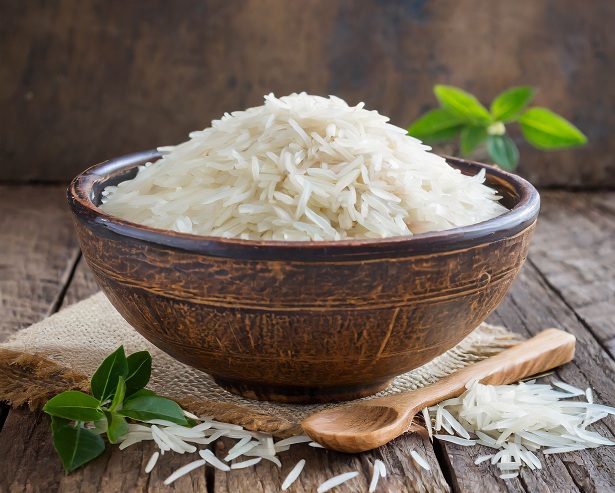Basmati rice calories can vary based on whether it’s cooked or uncooked. One cup of basmati rice calories may differ from the caloric content of the same amount of cooked basmati rice calories. Many people are curious about the nutritional value, especially the question of “how many calories in basmati rice?”
When looking at uncooked basmati rice calories, it’s important to note that the caloric content can change after cooking. For instance, while 1 cup basmati rice calories might be different in its raw form compared to 1 cup cooked basmati rice calories, the cooking process alters the rice’s composition.
If you are focused on portion control, understanding cooked basmati rice calories 100g becomes crucial. This information allows you to manage your intake based on weight. Additionally, for those preferring the healthier alternative, there’s the consideration of brown basmati rice calories, which may differ slightly from the white variety.
How many calories are in basmati rice?
Basmati Rice: A Nutrient-Rich and Flavorful Grain
Basmati rice is a fragrant and long-grain rice variety known for its distinctive aroma and fluffy texture when cooked. It has been a staple in South Asian cuisine for centuries, and its popularity has spread worldwide. Beyond its delicious taste and versatility in the kitchen, basmati rice also offers various nutritional benefits.
Nutritional Content
Basmati rice is a good source of essential nutrients, it is also used by healthy people to remain healthy and gain the proper diet. Nutritional content with all the details is given below.
-
Carbohydrates. They serve as an excellent source of energy due to their high carbohydrate content. One cup of cooked basmati rice typically contains around 45 grams of carbohydrates.
-
Protein. While not as high in protein as some other grains, basmati rice still provides a moderate amount. One cup usually contains around 4–5 grams of protein.
-
Fiber. Basmati rice contains a small amount of dietary fiber, contributing to digestive health. Fiber content can vary, but one cup may have about 1-2 grams.
-
Vitamins and minerals. Basmati rice contains small amounts of vitamins and minerals, including B vitamins, magnesium, and phosphorus. These nutrients play essential roles in various bodily functions, such as energy metabolism and bone health.
Health Benefits
-
Low in fat and sodium. Basmati rice is naturally low in fat and sodium, making it a heart-healthy choice when prepared without excessive added fats or salt.
-
Gluten-Free. Being a gluten-free grain, basmati rice is suitable for individuals with gluten sensitivities or celiac disease.
-
Sustainable energy source. The complex carbohydrates in basmati rice provide a steady release of energy, helping to maintain blood sugar levels and keep you feeling satisfied.
Cooking Tips
-
Rinsing. Before cooking, it’s recommended to rinse basmati rice under cold water to remove excess starch. This helps prevent the rice from becoming too sticky.
-
Water Ratio. The ideal water-to-rice ratio for cooking basmati rice is typically 1:2. That means one cup of rice requires two cups of water. Adjustments may be needed based on the specific cooking method and personal preference.
-
Soaking. Some people prefer soaking basmati rice for 30 minutes before cooking to achieve a fluffier texture. This step is optional but can enhance the rice’s overall quality.
Culinary Uses
-
Side Dish. Basmati rice is commonly used as a side dish for various curries, stews, and grilled or sautéed vegetables.
-
Pilaf and Biryanis. It is a popular choice for preparing pilaf and biryani dishes, where the rice is typically cooked with aromatic spices, herbs, and sometimes meat.
-
Salads. Cooled basmati rice can be used as a base for salads, adding a unique texture and flavor to cold dishes.
Conclusion
Basmati rice is more than just a flavorful grain; it’s a nutritious addition to a balanced diet. With its versatile nature, health benefits, and delightful aroma, basmati rice continues to be a cherished ingredient in kitchens around the world.
Whether enjoyed on its own or as part of a delicious recipe, basmati rice stands out as a wholesome and satisfying food choice.
Basmati rice is an aromatic grain that captivates many with its unique qualities. Renowned for its distinct fragrance and slender, elongated grains, it is often a preferred choice. It boasts a lower glycemic index, making it a suitable option for diabetics. Is basmati rice healthy for weight loss? Yes, its high fiber content aids in satiety. This versatile rice is not only a source of essential nutrients but also contributes to a flavorful culinary experience. Its nutritional profile, coupled with the delightful aroma, underscores why basmati rice is a popular and wholesome choice for a diverse range of dishes.
For those who enjoy precise measurements, calculating how many calories in a cup of basmati rice is essential. It helps in creating a more accurate dietary plan. Furthermore, the question of how many calories in a cup of cooked basmati rice provides insight into the nutritional impact of the cooking process.
In summary, understanding the nuances, whether they are 1 cup basmati rice calories, basmati rice calories cooked, or uncooked basmati rice calories, empowers individuals to make informed decisions about their diet and nutrition.



